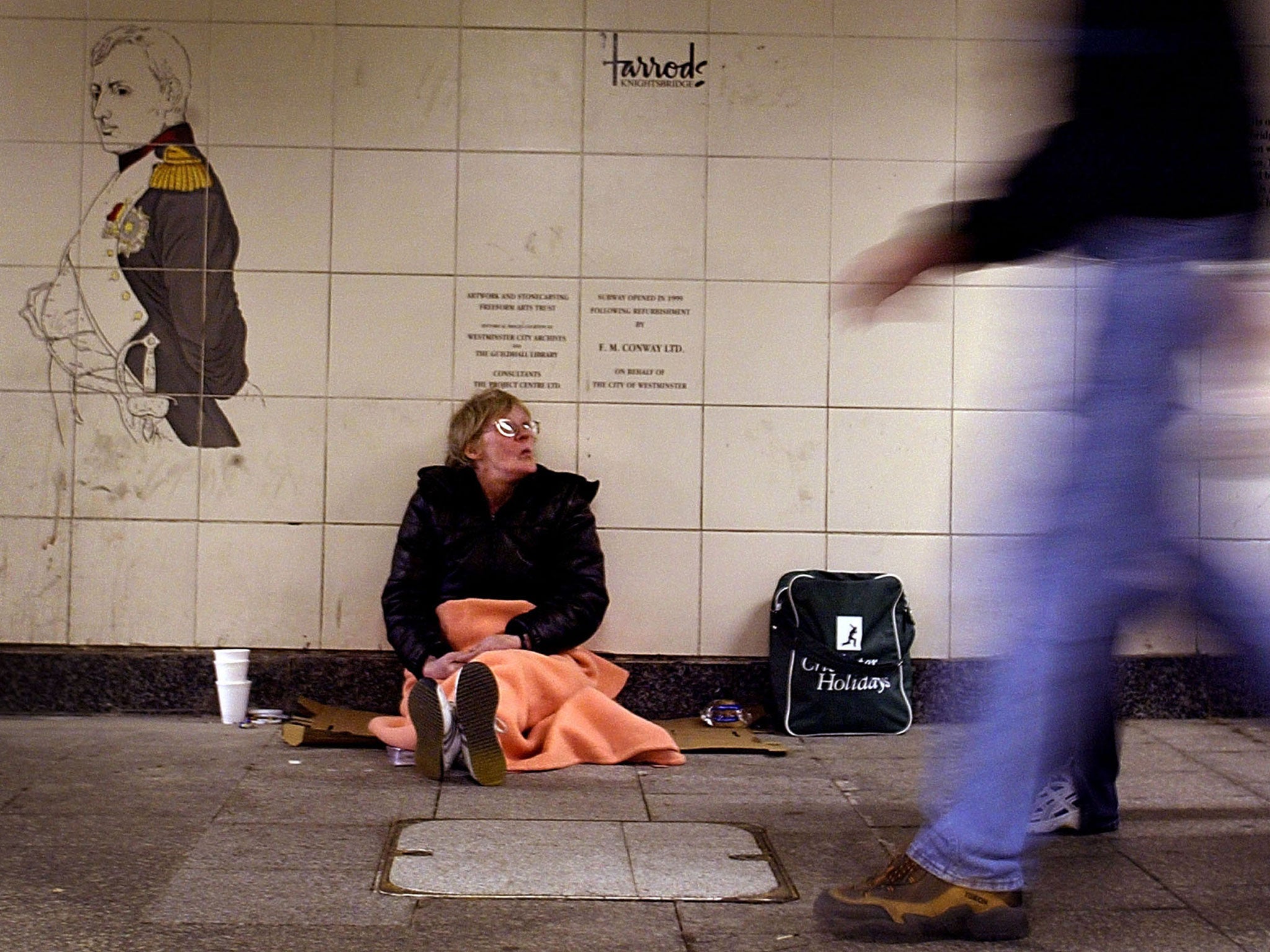Sudden rise in homelessness blamed on housing shortage and the 'bedroom tax'
Homeless charities raise the alarm after rough sleepers rise by 13 per cent in London this year, and six per cent across the country

Your support helps us to tell the story
From reproductive rights to climate change to Big Tech, The Independent is on the ground when the story is developing. Whether it's investigating the financials of Elon Musk's pro-Trump PAC or producing our latest documentary, 'The A Word', which shines a light on the American women fighting for reproductive rights, we know how important it is to parse out the facts from the messaging.
At such a critical moment in US history, we need reporters on the ground. Your donation allows us to keep sending journalists to speak to both sides of the story.
The Independent is trusted by Americans across the entire political spectrum. And unlike many other quality news outlets, we choose not to lock Americans out of our reporting and analysis with paywalls. We believe quality journalism should be available to everyone, paid for by those who can afford it.
Your support makes all the difference.The number of homeless people is rising sharply under the twin pressures of the shortage of housing and the impact of the Government's welfare reforms, according to a new study.
An annual “state of the nation” report by the charities Crisis and Joseph Rowntree Foundation (JRF) revealed that the number sleeping rough has risen by six per cent in England this year, and by 13 per cent in London. There has been a 10 per cent increase in those housed temporarily, including a 14 per cent rise in the use of bed and breakfast accommodation.
The report explicitly blames the Government’s welfare cuts for compounding the problems caused by the high cost and shortage of housing as demand outstrips supply. It found that the cap on housing benefit made it more difficult to rent from a private landlord, especially in London, and claimed the controversial “bedroom tax” has caused a sharp rise in arrears for people in public housing, particularly in the Midlands and North.
Last night ministers emphatically denied that their reforms had contributed to the return of homelessness. But it has now risen in each of the three years since the Coalition was formed – after falling sharply in the previous six years.
The Government’s own latest statistics show that 57,530 households were in temporary accommodation on September 30, an eight per cent rise on a year earlier. Some 2,100 families with children were in emergency B&B accommodation, the highest figure for a decade.
The spectre of homelessness is returning as housing and welfare rise up the political agenda. Labour has pledged to abolish the “bedroom tax” and Liberal Democrat MPs are increasingly anxious about its impact. There is concern that the Government’s Help to Buy scheme will inflate another housing bubble. To help supply match demand, Labour will promise at the 2015 election to double house-building to at least 200,000 a year by 2020.
The new study found that nine per cent of adults in England has been homeless at some point in their life.
Leslie Morphy, the chief executive of Crisis, said: “We keep hearing that the economy is on the mend. Yet as we watch our GDP figures slowly rise, cuts to housing benefit and woefully inadequate house building will keep pushing up homelessness. Shamefully, it is the poorest and most vulnerable that are bearing the brunt.
“We need the Government to address the chronic lack of affordable housing, take real steps to improve the private rented sector and to urgently consider the impact its cuts to housing benefit are having, particularly in the capital.”
Julia Unwin, chief Executive of JRF, said: “Homelessness is the tragic consequence of failures in our housing system and carries enormous cost for both the people facing destitution and society as a whole. To avoid these figures going in the wrong direction, we need to address the underlying causes of homelessness urgently. That means building the affordable homes this country desperately needs and providing a proper safety net for when people are unfortunate enough to fall on hard times.”
A separate survey by Inside Housing magazine showed that councils and housing associations are increasingly resorting to the threat of eviction. Some 113 social landlords issued a total of 99,904 notices seeking possession for rent arrears between April and November, a 26 per cent rise on the same period last year. Sam Lister, policy and practice officer at the Chartered Institute of Housing, said the tougher approach was “sadly not surprising” because “welfare reform is causing real difficulty.”
The Department for Work and Pensions said: "Our reforms are fixing the benefits system. There is no evidence that people will be made homeless as a result of the benefit cap, the removal of the spare room subsidy or any of our welfare reforms. We have ensured councils have £190m of extra funds this year to help claimants and we are monitoring how councils are spending this money closely."
Kris Hopkins, the Housing Minister, said: "I am determined to ensure that we don’t return to a time when homelessness was more than double what it is today. This Government has maintained strong measures to protect families against the threat of homelessness and acted decisively to introduce a more accurate assessment of previously-hidden rough sleeping. We have supported the national roll out of No Second Night Out to prevent persistent rough sleeping, and given councils greater freedoms to house people in private rented homes.
"On top this we have provided nearly £1bn for councils to reduce homelessness and support those affected, while delivering 170,000 more affordable homes since 2010. All this has meant statutory homelessness remains at a lower level than it was in 27 of the last 30 years.”
Join our commenting forum
Join thought-provoking conversations, follow other Independent readers and see their replies
Comments